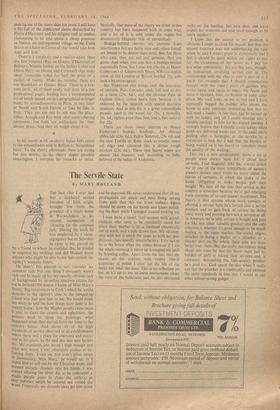The Servile State
By MARY HOLLAND
He didn't, I'm pleased to say, consider me common rich. For one thing I obviously wasn't rich and he made up for my equally obvious lack of background by inventing spacious estates for me. in Ireland ('Of course Lknow of Miss Mary's family. Big landowners in Cork') which he would describe in the agency's time to the jumped-up friend who had sent him to me. We .would drink tea while he told me how things were done in his stately home: how the Maples people came twice a year to clean the carpets and upholstery, the process used to clean the paintings, what happened when they moved from the town to the Country house. And above all of the high standards of service observed in an establishment where there was a place for everyone and every- one in his place. In the end this was why he left me. My standards just weren't high enough and what was worse I was absolutely useless at en- fording them. 'I can see you aren't given much to domesticity, Miss Mao': he would say as I urged him to call me by My Christian name and pressed miracle cleaners into his hands. I was always offering the silver dip, as he concocted a Magic purple paste to clean the cutlery, or easy polishes which he assured me ruined the wood. Eventually my slovenly ideas got him down and he departed. He never understood that all my propaganda for quick and easy living sprang from 'guilt that this far from stalwart figure should be down on his hands and knees polish- ing the floor while I lounged around making-tea.
1 now have a sweet, frail woman with grand- children who need to be constantly cared for when their mother is ill, a husband chronically out of work, and a pale drawn face. My relation- ship with her is much the same as with her pre- decessor, functionally unsatisfactory. I try not to be in the house when she comes because if I am the whole morning is taken up assuaging my guilt by brewing coffee. Apart from the fact that she cleans all the mirrors with visibly liberal quantities of polish I cant' for the life of me make out what she does. This is no reflection on her, as it's up to me to leave instructions about the state of the bathroom and the dirt-encrusted walls on the landing, but how does one leave orders for someone old and tired enough to be one's mother?
I know that the answer to my problem is obvious. I ought to clean fdr myself. Bin then my second footman was not understating the case when he said I wasn't given to domesticity and I feel it should be quite within my rights to pay for the cleanliness of my house as I pay for any other commodity: It's not that easy, though; no transaction involving service ever is. The relationship with my char is only a part of it. I know for example that I should remonstrate fiercely with the cheery pairs of gasmen who arrive again and again to repair the Ascot and leave it blocked, bent, or broken in some other place. My roof leaks on me in bed and I have repeatedly begged the builder who knows the house to send someone, reminding him that he will need a ladder. A few days ago' he turned up with no ladder and all I could manage was a humble apology to him for his wasted journey. I strongly. believe that I should create scenes when goods are delivered weeks late, or the paint starts peeling after a fortnight: or the service in a restaurant is bad, but I find that the burden of being waited on is too heaVy to complain about the quality of the waiting.
This isn't a new predicament. Quite a lot of people must always have felt it about their servants. Enid Bagnold, who has always struck me as one of the most synipathetic of nature's grondes daMes, once wrote an essay about the horrOr of servants, in which she spoke of the hated 'obligation to make people pull their weight.' We hear all the time that service in this country is atrocious because we're just emerging from centuries of servant-master resentment. The theory is that anyone whose work consists of offering a service feels he's forced into a servile position and so gets back at society by doing lousy work and proving he's not a servant at all. In America, we're told, service is bought and paid for like any other saleable product and the only criterion is whether it's good enough to be worth buying in the open market. No social stigma attaches to being a waiter or a plumber or a cleaner and on the whole these jobs are done better over there. But the really marvellous thing about this must be that the buyer need feel no burden of guilt at taking their services and, if necessary. demanding the high-quality product he's paid for. God speed the day when I really can feel the plumber is a commodity and demand the same standards in him that I would in any other labour-saving gadget.


































 Previous page
Previous page